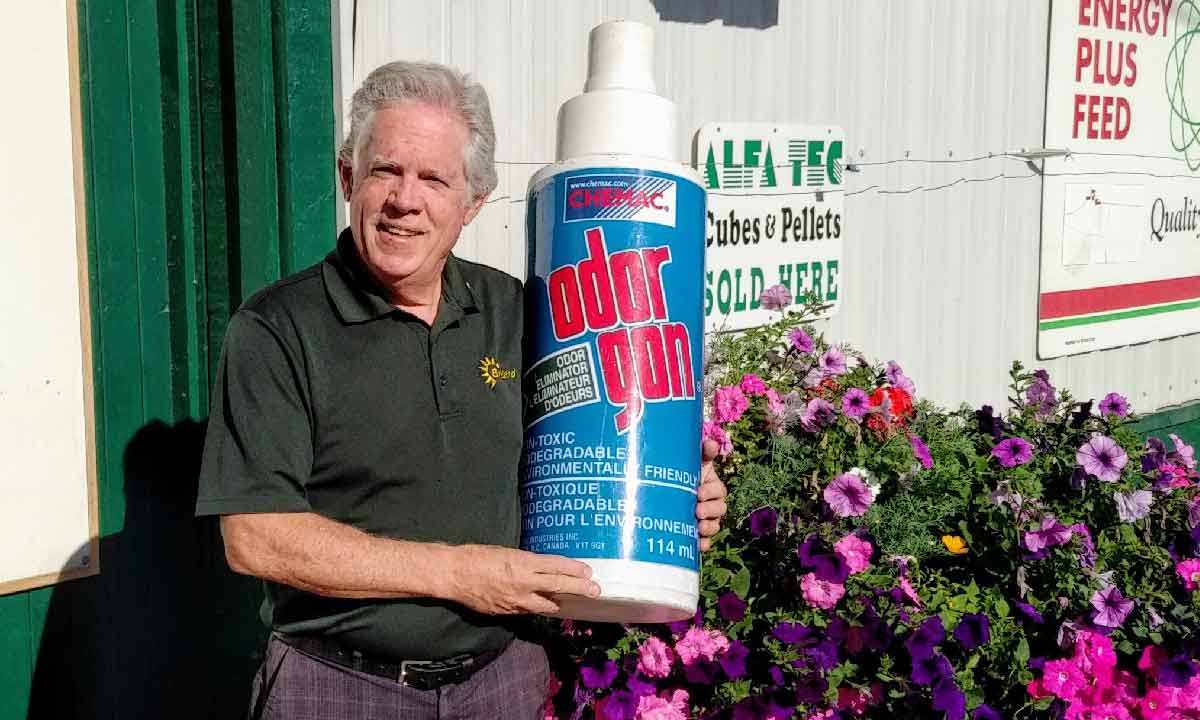In business, change is inevitable. But the COVID-19 pandemic brought about a level of change that businesses couldn’t foresee or plan for. Our #SmallBusinessRedefined series showcases small businesses that have found ways to reimagine their business through new opportunities — whether it’s through a new product, a new market, or a new way to fulfill. Learn how these Canadian businesses have pivoted to adapt, innovate and thrive in a changing and uncertain environment.
If you ask Dave Weatherill to describe what Briteland offers, it’s not a simple answer.
When Dave and Joanne Weatherill started out in 1984 they specialized in agriculture. But after a few years of dealing with the seasonality of farming, they expanded to town and country supplies to serve their urban population and generate a year-long revenue stream. Following a discussion with a farmer who was looking for bagged carrots, they launched a wholesale division. After that they forayed into janitorial equipment and supplies then onto packaging and shipping materials. And they do worm composting.
Diversification Saves the Day
Briteland offers what might at first glance be a dizzying combination of products and services. But it’s this diversification that has allowed them to remain successful through the COVID-19 pandemic, even as many of the country’s businesses struggled. “We don’t have just one revenue stream and one reason to shop with us,” says Weatherill. “Our business therefore wasn’t told to close. We were an essential service in all of our divisions.”
In particular, they shifted their energies into Bacoban DLUS™ — a non-corrosive, controlled release, high quality cleaner that disinfects surfaces without breaking down equipment. “It has been selling off the shelves,” says Weatherill, as it appeals to the hospitality industry, elder care and other businesses that are highly focused on sanitation as the country re-opens.
But it hasn’t just been Briteland’s diverse product mix that has kept their business running. Their broad roster of suppliers has also allowed them to keep their shelves stocked and customers happy. “Having multiple suppliers has really paid off,” says Weatherill. “Each of them suffered with supply chain. So if supply dried up in one spot, our relationships with others were really helpful.”
The Power of Relationships
Weatherill puts a great deal of value in the relationships he has formed over the last 37 years in business — relationships formed with suppliers, customers and even competitors.
“Our suppliers were getting requests from people they had never dealt with previously. Before they would release product to them, they would call us first to find out our needs and plans.”
And over the years, Weatherill has seen larger businesses and big box stores come into town, all of which have similar offerings to Briteland. But each time a store opened up, Briteland’s business grew. “They refer people to us because we have a knowledge base and product grouping that is unique. Their staff have shopped here so they know us.”
When it comes to their customer relationships, that’s something Weatherill takes very seriously. “We want to do best for our clients. Service, reliability, having choices, being a fun place to deal with — these are all very important,” says Weatherill. “Our customers are able to trust us. They keep coming back for more. They rely on us to get them through times of need.”
Plus, when people shop with them, their pets get a treat, people tell them their stories and they brighten people’s day.
Their commitment to their customers goes beyond service and pet snacks, however. Everything they bring into their store is with their customers’ interests in mind. “We focus on higher value products and better performing products because customers want materials that do the job for them.”
They are always on the lookout for products that fit with their values and help make the world a better place — from urban chicken supplies to eco-friendly take-out containers to worm composting (they can’t keep up with the demand for worms these days). “Doing things for the right reasons pays off,” explains Weatherill.
Tips for Other Business Owners
Given Briteland’s successes during the pandemic, Weatherill shares the following best practices to help other business owners get through tough times.
- Offer the best value you can for your clients. Deliver reliability, great service, choice and fair prices. Focus on higher value and better performing inventory.
- Diversify your revenue streams. If one isn’t working for you at a particular time, another can fill the gap.
- Work with multiple suppliers. Getting inventory from different places will help reduce supply chain issues.
- Keep an eye out for unique opportunities that you can grow with.
- Listen to what clients are asking. Offer them what they need, not necessarily what they came in for.
- Deliver on promises. Be a business that solves problems.
Briteland’s ability to leverage the diversity they have worked hard to establish — and their focus and products and services that are in demand in the current environment — has enabled them to remain strong, resilient and successful throughout the pandemic.
This article is intended as general information only and is not to be relied upon as constituting legal, financial or other professional advice. A professional advisor should be consulted regarding your specific situation. Information presented is believed to be factual and up-to-date but we do not guarantee its accuracy and it should not be regarded as a complete analysis of the subjects discussed. All expressions of opinion reflect the judgment of the authors as of the date of publication and are subject to change. No endorsement of any third parties or their advice, opinions, information, products or services is expressly given or implied by Royal Bank of Canada or any of its affiliates.



















